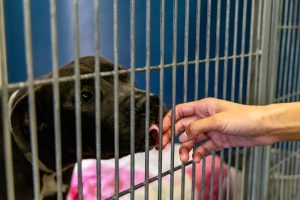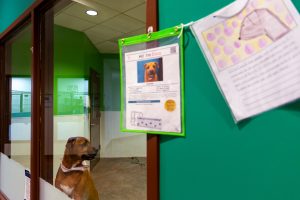- Slug: BC-CNS-Animal Shelter. 1,135 words.
- Photos available (thumbnails, captions below).
By Julia Schamko
Cronkite News
PHOENIX – Walking into the Maricopa County Animal Care and Control (MCACC) West Valley Animal Care Center, visitors are met with endless rows of barking dogs, some two to a kennel, with the organization at more than 100 dogs over capacity as of Monday.
“It’s both a human crisis and animal,” said Leanna Taylor, CEO of the Arizona Pet Project, which works with shelters across the state to keep pets and owners together.
Taylor said that as Arizona residents have struggled financially in recent years, more feel they have no choice but to give their pets up to a shelter.
“Our shelters are a canary in the coal mine for what’s happening in our communities,” Taylor said. “What increasing shelter intake means is that we have a community that’s really struggling.”
Despite previous holiday seasons having an increase in adoption numbers, the 2023 holidays saw a dip in adoption rates at MCACC.
“A lot of people are not in a place to adopt, or people are turning in their dogs to us because they don’t feel they have any other options,” MCACC Director Kim Powell said.
Large dog breeds in particular are overwhelming the two MCACC shelters, specifically huskies, German shepherds and pit bulls. Pet size and breed restrictions at rented residences across the area may be one reason behind this increase.
Despite the challenges faced by shelters and pet owners, there is hope.
“We have to take it day by day,” Powell said. “Within the last year, we’ve undergone a new administration (at the shelter), we’re going through new policies, we’re coming up with different programs to try to better the shelter so that we can better serve the pets in our care as well as the community.”
MCACC now has a fully staffed veterinary team. The organization is also in the process of building a new shelter to replace the current East Valley Animal Care Center, which is set to open in May.
Features of the new shelter will include larger, angled kennels providing blinders for the dogs to minimize their stress levels and limit the spread of disease; nearly 21 play yards, some bigger than those currently available, allowing for play groups among dogs who are stable for socialization; and a state-of-the-art veterinary clinic.
Powell said the new shelter will better reflect the organization’s values. “We don’t want to be known as the ‘pound.’ We’re a shelter. We care about the dogs. We’re more than that.”
MCACC introduced shelter diversion navigators a year ago to work with people feeling like they need to surrender their pets for any number of reasons. Navigators calm owners down, talk with them about why they are giving up a pet, and walk them through their options.
And it’s not just the shelters involved in this process. New Hope partners of MCACC help find new homes for dogs the shelter may no longer be equipped to handle, due medical emergencies, kennel deterioration or other problems. In exchange, MCACC is offering $250 for each dog pulled off the euthanasia list through the end of March.
“We want to support them (New Hope partners) because sometimes we’re not able to make sure that the pet gets the spay/neuter surgery before they leave if they go to a rescue partner,” Powell said. “Providing them the funding for medical and behavioral costs we hope at least helps.”
Fostering and adopting dogs
One New Hope partner, Love Them All Sanctuary and Rescue, has been working with MCACC since opening in June 2020. The nonprofit’s recent mission has been to take in dogs in need of urgent medical care that Maricopa County may not be equipped to handle.
Though mainly a foster-based rescue, Love Them All’s new sanctuary in Scottsdale houses up to 20 dogs as it sorts through the animals’ medical needs and works toward placing them with foster families.
“I had started fostering for another rescue here in Scottsdale, and they were great … but they did not focus on e-listed dogs (those on the euthanasia list), and they did not take in all breeds,” said Love Them All founder Christine Conroy. “Those were kind of the ones that always tugged at my heart … so I kind of just decided to start my own rescue … and kind of changed the way rescue is perceived and the way it operates here in Arizona.”
Nearly 60% of the dogs that have come into the sanctuary are large-breed dogs, with the most recent weeks bringing in many pit bull mixes, she said.
“We’re able to provide more specialized care and we just compile all the resources we need for that dog to ultimately be rehabilitated and then adopted into the perfect home,” Conroy said.
Dogs awaiting fostering at the sanctuary are kept on a strict schedule of medical aid, enrichment and care.
“We really wanted a really great balance of everything for the dog that that given dog needs on a daily basis,” Conroy said. “So, that’s rest, that’s play, that’s enrichment, that’s mental stimulation, that’s training, that’s cuddle time … you name it.”
Since the addition of the facility, Conroy and staff have been able to get a better evaluation of each dog coming through, from medical history and needs to behavioral skills, so the organization can place them into foster homes.
Conroy said her sanctuary is in the process of adding space for an additional 30 to 40 dogs to be housed while they wait for foster homes.
Those who foster dogs through Love Them All are provided full financial support and regular check-ins from Conroy and her staff as they work toward preparing each dog for adoption.
Preventing pet and owner separation
Arizona Pet Project’s shelter prevention model was launched in 2015 when the organization saw that over 40% of animals sent to shelters were due to owners’ situational or financial crises.
“Our entire organization is designed to remove barriers to a family’s ability to keep their pet in their home,” Taylor said.
Among those most often in need are low-income minority families. The Humane Society of the United States has included the Arizona Pet Project as a partner organization of the “Pets for Life” program to aid those families.
“It’s door-to-door outreach,” Taylor said. “The goal of the program is really to outreach to our low-income, highest-need communities to provide full support for them and their pet family – whether that’s food, vaccines, supplies.”
The program offers English and Spanish support to create as much accessibility as possible to those in need of services.
The Arizona Pet Project offers resources from housing to veterinary care to licenses and more.
What each of these organizations hopes to convey is there are resources available to those in need to keep pets and families together, regardless of financial or situational crises.





